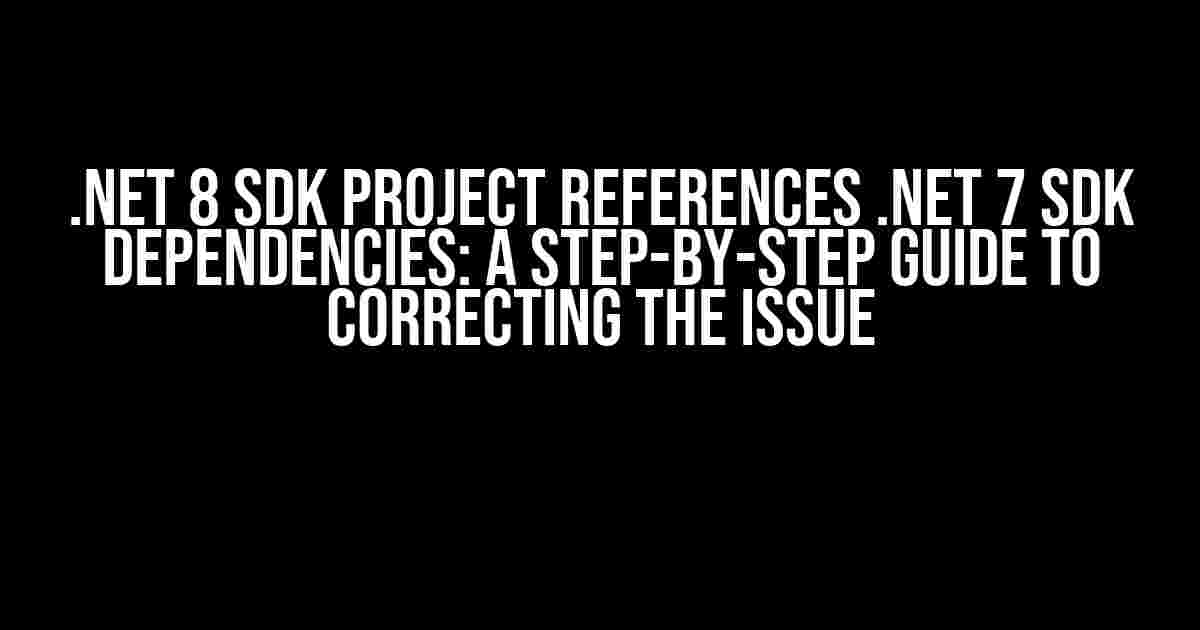If you’re reading this, chances are you’ve stumbled upon a peculiar issue in your .NET 8 SDK project. You’ve tried to upgrade to the latest version, but somehow, your project is still referencing .NET 7 SDK dependencies. Don’t worry; you’re not alone! This article will walk you through the process of identifying and correcting this issue, ensuring a seamless development experience with .NET 8.
Understanding the Problem
Before we dive into the solution, let’s take a step back and understand what’s happening behind the scenes. When you create a new .NET 8 SDK project, it’s expected to use the latest dependencies and frameworks. However, in some cases, the project might still reference older versions, causing compatibility issues and affecting performance.
Why Does This Happen?
- Upgrading from an older .NET version: When migrating from .NET 7 to .NET 8, some dependencies might not be updated automatically, resulting in conflicts.
- Missing or incorrect NuGet package updates: Failing to update NuGet packages or inconsistent package versions can lead to .NET 7 dependencies being referenced.
- Inconsistent SDK versions: Having different SDK versions installed on your machine can cause projects to reference older dependencies.
Identifying the Issue
To confirm that your .NET 8 SDK project is referencing .NET 7 SDK dependencies, follow these steps:
- Open your .NET 8 SDK project in Visual Studio.
- In the Solution Explorer, right-click on the project and select “Unload Project”.
- Right-click on the project again and select “Edit Project File”.
- In the project file, search for `` and check the version. It should be `net8.0`. If it’s not, update it accordingly.
- Search for `` and check the version. If it’s still referencing .NET 7, you’ll see something like `Microsoft.NET.Sdk, Version=7.0.0`.
Correcting the Issue
Now that we’ve identified the problem, let’s correct it! Follow these steps to update your project references:
Step 1: Update the SDK Version
<Sdk>Microsoft.NET.Sdk, Version=8.0.0</Sdk>
Update the `` version to 8.0.0. This will ensure that your project uses the latest .NET 8 SDK.
Step 2: Update NuGet Packages
In the Solution Explorer, right-click on the project and select “Manage NuGet Packages”. In the NuGet Package Manager, select the “Updates” tab and update all packages to the latest version.
Step 3: Remove .NET 7 Dependencies
In the project file, search for any references to .NET 7 dependencies, such as:
<PackageReference Include="Microsoft.NET.Sdk FUNCTIONS" Version="7.0.0"/>
Remove or update these references to use the latest .NET 8 versions.
Step 4: Verify the Changes
Save the project file and reload the project in Visual Studio. Verify that the `` and `` versions are updated to `net8.0` and `Microsoft.NET.Sdk, Version=8.0.0`, respectively.
Common Issues and Solutions
If you encounter any issues during the correction process, refer to the following troubleshooting section:
| Issue | Solution |
|---|---|
| Error: “The SDK ‘Microsoft.NET.Sdk’ specified could not be found.” | Check that you have the .NET 8 SDK installed on your machine. You can download it from the official Microsoft website. |
| Error: “Package ‘Microsoft.NET.Sdk FUNCTIONS’ is not compatible with ‘net8.0’.” | Update the package to the latest version compatible with .NET 8. You can do this by updating the package in the NuGet Package Manager. |
Conclusion
Correcting the issue of a .NET 8 SDK project referencing .NET 7 SDK dependencies is a straightforward process. By following the steps outlined in this article, you’ll be able to identify and correct the problem, ensuring a seamless development experience with .NET 8. Remember to regularly update your NuGet packages and verify your project references to avoid similar issues in the future.
If you have any further questions or concerns, feel free to ask in the comments below. Happy coding!
Frequently Asked Question
Got stuck with .NET 8 SDK project referencing .NET 7 SDK dependencies? Don’t worry, we’ve got you covered!
What’s the issue with .NET 8 SDK project referencing .NET 7 SDK dependencies?
The issue arises when you try to reference a .NET 7 SDK project from a .NET 8 SDK project. Since .NET 8 is a newer framework, it’s not compatible with .NET 7 dependencies, causing conflicts and errors. This incompatibility prevents your project from building and running smoothly.
Why does .NET 8 SDK project reference .NET 7 SDK dependencies in the first place?
This usually happens when you upgrade your project from .NET 7 to .NET 8, but forget to update the referenced projects or dependencies to .NET 8 as well. As a result, the .NET 8 project still references the old .NET 7 dependencies, causing the incompatibility issue.
How do I correct the issue and make my .NET 8 SDK project work with .NET 8 dependencies?
To correct the issue, you need to update the referenced projects or dependencies to .NET 8. You can do this by opening each referenced project, updating the TargetFramework to .NET 8, and then saving the changes. Once all referenced projects are updated, your .NET 8 SDK project should be able to build and run without any issues.
What if I’m using NuGet packages with .NET 7 dependencies? How do I update them to .NET 8?
If you’re using NuGet packages with .NET 7 dependencies, you’ll need to update them to .NET 8-compatible versions. You can do this by running the command `dotnet outdated` in your terminal to find outdated packages, and then updating them using `dotnet update`. Make sure to check the package documentation for any breaking changes or updates required for .NET 8 compatibility.
Are there any additional steps I need to take to ensure my .NET 8 SDK project is fully compatible with .NET 8?
Yes, after updating your referenced projects and NuGet packages, it’s essential to review your project’s code and configuration to ensure it’s fully compatible with .NET 8. Check for any deprecated APIs, breaking changes, or configuration updates required for .NET 8. You may also want to run your project through various testing scenarios to ensure it works as expected.
